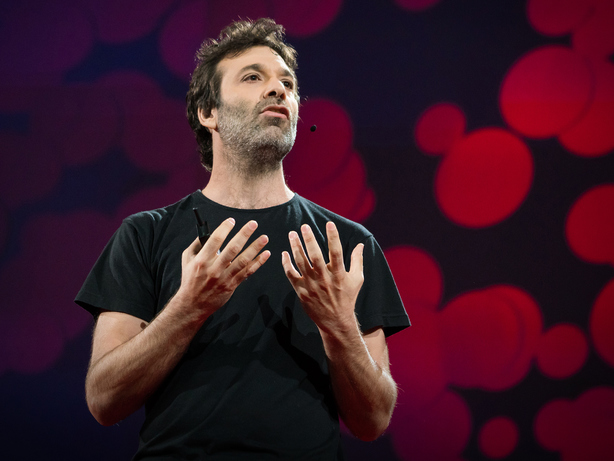We have historical records that allow us to know how the ancient Greeks dressed,
我们有历史纪录可循,可以让我们知道古希腊人如何穿着、
how they lived, how they fought, but how did they think?
如何生活、如何打仗,但他们如何思考呢?
One natural idea is that the deepest aspects of human thought
有一个很自然的方法就是,去探索人类最深层的想法
our ability to imagine, to be conscious, to dream, have always been the same.
我们的想象力、自觉力、梦想力,是否是一样的。
Another possibility is that the social transformations that have shaped our culture
另一种可能是,去探索造就我们文化的社会变革,
may have also changed the structural columns of human thought.
这些变革也许就是,改变人类想法的主要因素。
We may all have different opinions about this.
对这一点,大家或许有不同的看法。
Actually, it's a long-standing philosophical debate.
实际上,这是一个存在已久的哲学辩论。
But is this question even amenable to science?
究竟这个问题是否可以,经由科学来处理?

Here I'd like to propose that in the same way we can reconstruct how the ancient Greek cities looked just based on a few bricks,
我的建议是,如同仅藉由一些砖头,我们得以重建希腊古都的外貌,也可用同样的方式,
that the writings of a culture are the archaeological records, the fossils, of human thought.
藉由一些文化作品、建筑历史、化石,来了解人类的想法。
And in fact,
而实际上,
doing some form of psychological analysis of some of the most ancient books of human culture,
因为做了一些人类古老文化书籍的心理分析,
Julian Jaynes came up in the '70s with a very wild and radical hypothesis:
裘利安·杰尼斯在70年代发表了一个相当大胆激进的假说:
that only 3,000 years ago, humans were what today we would call schizophrenics.
他说,3000年前的人类,是我们现在俗称的“精神分裂症患者”。
And he made this claim
他会如此主张的原因是,
based on the fact that the first humans described in these books behaved consistently,
在世界各地不同的传统及地方,这些书籍里面所描述的人类行为
in different traditions and in different places of the world,
似乎不约而同地都会服从
as if they were hearing and obeying voices that they perceived as coming from the Gods, or from the muses
他们认为是从神祗那边传来的声音。
what today we would call hallucinations.
而如今,我们会称之为幻听或幻觉。
And only then, as time went on,
随着时间的洗礼,
they began to recognize that they were the creators,
他们开始认知到,那些声音是他们自己创造的,
the owners of these inner voices.
他们就是那些内在声音的主人。
And with this, they gained introspection:
有了这样的认知,他们学会了自省:
the ability to think about their own thoughts.
一种反思自己想法的能力。
So Jaynes's theory is that consciousness,
所以杰尼斯对“意识”的理论就是,
at least in the way we perceive it today,
至少现今我们觉察到“意识”、
where we feel that we are the pilots of our own existence --
感受到我们自己就是,
is a quite recent cultural development.
人生导师的体悟是相当近代的文化发展。
And this theory is quite spectacular,
这理论相当特别,
but it has an obvious problem which is that it's built on just a few and very specific examples.
但它有一个很明显的问题就是,它是建立在极少又特定的案例上。
So the question is whether the theory that introspection built up in human history only about 3,000 years ago
所以问题是,3000年来人类才建立起,自省能力的这个理论,
can be examined in a quantitative and objective manner.
是否可以经得起“量化”且“客观”的考验。



